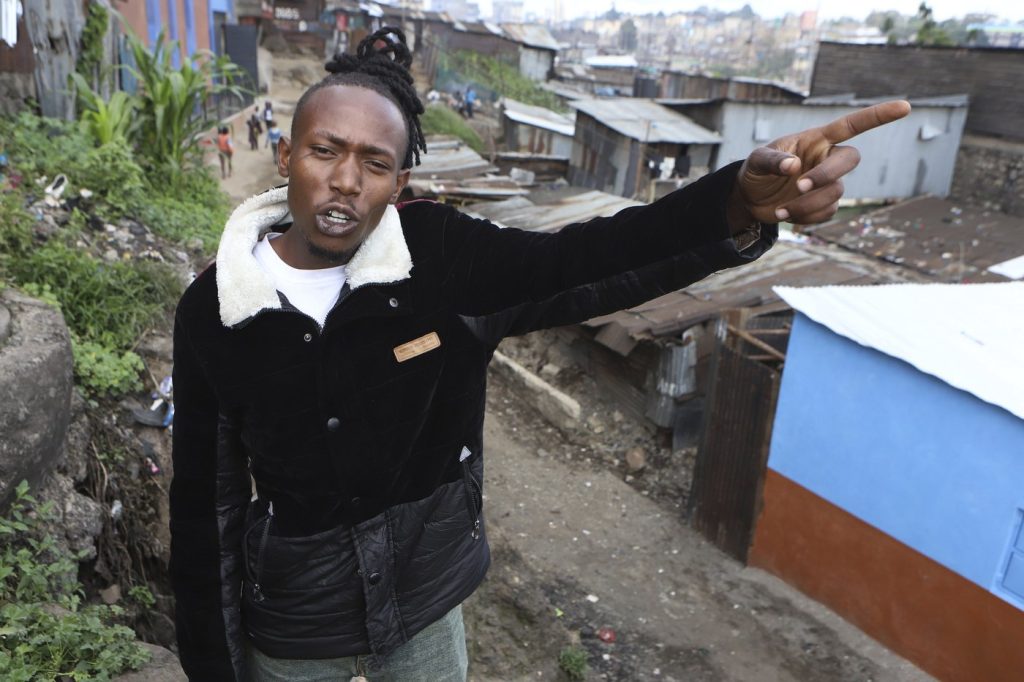MATHARE, Kenya — Joseph Kariaga, along with his friends, once embraced a "gangster life" in the Mathare slum of Nairobi, engaging in theft and violence against police. However, the murder of Kariaga's brother by police sparked a critical reflection among the young men, leading them to reassess their dangerous lifestyle. "We said, ‘We cannot live like this. We are going to lose our lives. Many of our friends had died,’” Kariaga, now 27, recounted. This tragedy compelled them to pursue a different path.
In 2017, the group founded Vision Bearerz, a collective focused on redirecting youth away from crime while tackling food insecurity in one of Kenya's most impoverished areas. Despite facing numerous challenges, Vision Bearerz has made a significant impact, providing weekly lunches for over 150 children and earning the respect of many residents who now see the men as role models.
Mathare is a densely populated area, home to approximately half a million people within less than two square kilometers, and part of the larger context where about 60% of Nairobi’s population lives in informal settlements according to CFK Africa, a non-governmental organization involved in health and poverty reduction. The executive director of CFK Africa, Jeffrey Okoro, highlighted the lack of infrastructure as a crucial challenge, exacerbated by rapid urbanization and rising youth populations in sub-Saharan Africa.
Poverty often drives youth towards crime, with many struggling to afford basic necessities. Okoro pointed out that children under five are particularly vulnerable to malnutrition, and the existence of gangs presents a tempting allure for quick financial gains. The members of Vision Bearerz are starkly aware of these pressures from their own backgrounds.
"When you are born from this land, there is not much you have inherited, so you have to make it yourself,” lamented Ben Njoki, 28, whose tattoos signify a past tied to gang life. The turning point for him and others came after the death of many friends. “We realized we would follow if we did not find an alternative to crime,” added Moses Nyoike, the chair of Vision Bearerz.
The community initiative began by cleaning garbage and trading vegetables, spotting a local need in Mathare. With permission from local authorities, they transformed a garbage dump into a farm. Faced with challenges such as contaminated soil and water shortages, Vision Bearerz adopted hydroponics after seeing success on a TikTok account showing urban farming in a Colombian slum. Assisted by an NGO, Growth4Change, they received materials and training needed for sustainable farming.
Currently, Vision Bearerz cultivates vegetables, raises pigs, and fishes for tilapia in a pond. They reinvest profits from selling produce and running supplementary services such as a car wash and public toilets back into the community. This funding helps support weekly meals comprised of maize flour and beans, complementing their own farmed goods.
The organization also runs outreach programs aimed at educating youth about drug use and crime and holds sessions for women to discuss health issues with girls. “The life I was living was a lie. It didn’t add up to anything. We just lost people. Now, we are winning people in the community,” Njoki expressed, reflecting on their transformative journey.
Davis Gichere, 28, another founder, referred to their collective work as therapeutic. However, challenges persist; joining Vision Bearerz necessitates a commitment to abandon criminal activities, and instances of relapse have occurred. Some members have faced police harassment due to their former reputations, and securing consistent funding for community meals remains a weekly battle, particularly amid cuts in foreign assistance that affect organizations like theirs.
Similar initiatives, such as the Human Needs Project in Kibera slum, demonstrate that this model of community-led urban farming to deter crime and address food scarcity may have broader applicability. Experts like Okoro see the future of development in organizations led by locals who best understand their community’s needs. Kariaga, still processing his brother's tragic death, takes pride in his new role, stating, “Farming can change the world.”











